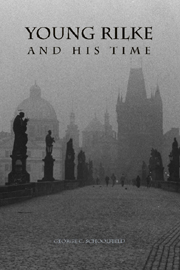5 - Rilke's Diary from Westerwede and Paris, 1902
from II - Diaries
Published online by Cambridge University Press: 05 February 2013
Summary
The Westerwede entries in Rilke's Westerwede diary were written in the wake of his marriage to Clara Westhoff on 28 April 1901, the establishment of their household in the vicinity of Worpswede, and the birth of little Ruth on 12 December of the same year, an event announced first with a new father's traditional joy, followed shortly by desperate tones, for example, to Axel Juncker on 18 January: “Es ist eine schwere, schwere Zeit, eine Zeit, wie ein Maeterlinck'sches Schloß mit langen leeren Gängen und Thüren, die ins Nichts führen” (AJ, 52; It is a difficult, difficult time, a time like a Maeterlinckian castle, with long, empty corridors and doors leading into nothingness). Cries for help were sent off right and left, often to persons whom he knew only fleetingly, for example, Arthur Schnitzler: “Denken Sie meine Bestürzung: der Zusammenhang mit der Zeit fehlt mir ganz … und ich weiß, daß es für meine Kunst keine größere Feindschaft giebt, als die Zeit … das Tägliche … das Allzutägliche” (ASchn, 290; Imagine my consternation: I totally lack a connection with the time … and I know that there is no greater enmity for my art than the time, the everyday world … the all-too-everyday world). In a very long letter to Gustav Pauli, the director of the Bremen art gallery, he summed up his situation with a phrase of high drama: “ein Schicksal von großer Grausamkeit” (GB 1:187; a fate of great cruelty).
- Type
- Chapter
- Information
- Young Rilke and his Time , pp. 134 - 148Publisher: Boydell & BrewerPrint publication year: 2008



